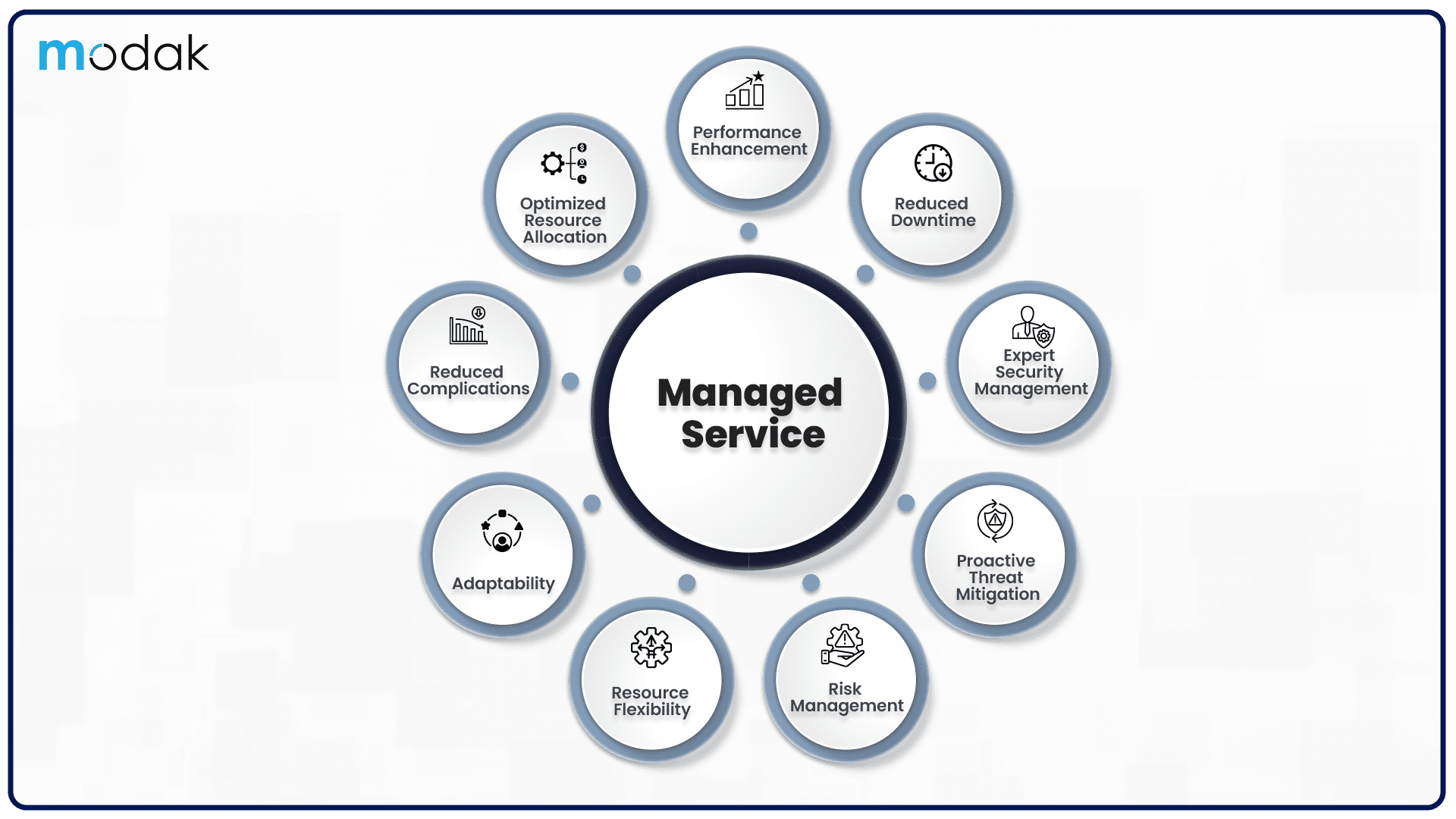Importance of Operational Efficiency in Business Organizations
Business organizations need to be operationally efficient because it can help them to reduce costs and improve efficiency, businesses can increase their profits. As per the findings of Bain & Company, highly efficient companies are 6 times more likely to experience revenue growth of more than 15% compared to their less efficient counterparts.
Operational efficiency is the linchpin of organizational success. It not only optimizes resource utilization but also paves the way for innovation, agility, and customer satisfaction. In a competitive landscape, efficiency is the key to survival.
Benefits of Managed Services
- Cost Reduction: Managed services providers (MSPs) can help organizations reduce operational costs by efficiently managing IT infrastructure and support systems.
- Enhanced Security: By leveraging the expertise of MSPs, businesses can strengthen their security protocols and risk management strategies.
- Scalability: Managed services provide businesses with the flexibility to scale their operations up or down according to their specific needs.
For instance, Hadoop and Cloud Services are prime examples of managed services that have revolutionized the business landscape. Hadoop, a distributed data processing framework, offers data storage and processing capabilities. On the other hand, cloud services provide on-demand access to computing resources, enabling businesses to scale as needed.
Hadoop, known for its prowess in distributed data processing, has now become a managed service. It offers a comprehensive solution for data storage, management, and processing. Managed Hadoop services empower organizations to harness the capabilities of this framework without the intricacies of in-house management.

Key Aspects of Managed Services:
Impact of Managed Services on Operational Efficiency
Streamlining IT Infrastructure:
Incorporating managed services into IT infrastructure management significantly streamlines operations. Let us see how:
- Optimized Resource Allocation: Managed Service Providers (MSPs) have the expertise to allocate IT resources efficiently. They can identify underutilized assets and redistribute them where needed, maximizing resource utilization.
- Performance Enhancement: MSPs continuously monitor and fine-tune IT components, such as servers, network devices, and databases. This proactive maintenance ensures optimal performance and minimizes downtime.
- Reduced Downtime: The quick identification and resolution of IT issues by MSPs lead to reduced downtime. It is critical for business continuity, as every minute of downtime can translate into lost revenue and productivity.
Enhancing Security Protocols:
Managed services also enhance security, a pivotal component of operational efficiency:
- Expert Security Management: MSPs employ skilled security experts who are well-versed in the latest threats and vulnerabilities. They develop and implement robust security strategies customized to the organization's specific objectives and goals.
- Proactive Threat Mitigation: With continuous monitoring and threat detection, MSPs can identify and neutralize potential security threats before they escalate. This proactive approach prevents data breaches and cyberattacks that can disrupt operations and damage reputation.
- Risk Management: Managed security services encompass risk assessment and compliance management. By staying ahead of regulatory requirements, organizations reduce legal and financial risks associated with non-compliance.
Improving Scalability:
The ability to scale operations efficiently is a hallmark of managed services:
- Resource Flexibility: Managed services offer on-demand access to additional resources as needed. This means that businesses can easily scale up during periods of high demand and scale down during quieter times, optimizing resource expenditure.
- Adaptability: MSPs help organizations adapt to evolving market conditions and customer demands. By providing the infrastructure and support required for rapid growth, enterprises can remain agile and competitive.
- Reduced Complications: Scaling operations can be complex, but managed services simplify the process. MSPs handle the technical aspects, from provisioning new resources to ensuring their seamless integration with existing systems. It minimizes complications and the associated downtime.
Fostering Developer Confidence and Customer Satisfaction: The reliability of the infrastructure underpinned by managed services cultivate a deep sense of confidence in developers. They can confidently push their codes to production, knowing that the infrastructure will be consistently available for end users. The unwavering reliability not only supports smooth operations but also significantly contributes to customer satisfaction. When customers can access products and services without disruptions, their trust in the business grows.
In a nutshell, the path to operational efficiency is one that modern businesses cannot afford to overlook. Managed services offer a comprehensive solution that not only optimizes operations but also boosts productivity and security. By implementing the best practices and understanding the impact of managed services, organizations can unlock their full potential and thrive in today's competitive business landscape.
Future Trends in Managed Services for Scaling Operational Excellence
Several key trends are shaping this transformation:
AI and Automation Integration: Artificial Intelligence (AI) and automation will play a pivotal role in managed services. AI-driven analytics and machine learning will enable predictive maintenance, proactive issue resolution, and dynamic resource allocation, ensuring operations remain efficient and scalable.
Enhanced Cybersecurity Services: With the growing threat landscape, managed services providers will place a greater emphasis on cybersecurity. Advanced threat detection, response capabilities, and compliance management will be integrated to safeguard data and operations.
Edge Computing Support: As edge computing gains prominence, managed services will extend to manage edge devices and infrastructure. This trend ensures efficient processing of data closer to the source, reducing latency and enhancing scalability.
Hybrid and Multi-Cloud Management: With businesses increasingly adopting hybrid and multi-cloud strategies, managed services will focus on unified cloud management. The approach streamlines operations, optimizes resource utilization, and ensures scalability across diverse cloud environments.
IoT Management: The Internet of Things (IoT) will see widespread adoption, and managed services will provide IoT device management, data analytics, and security solutions. The trend will support the scalability of IoT deployments in various industries.
Conclusion
Managed services have become an indispensable tool for organizations aiming to maximize operational efficiency in today's highly competitive business landscape. With the ability to streamline IT infrastructure, enhance security protocols, and facilitate scalability, they are catalysts for innovation, agility, and customer satisfaction. The integration of technologies like Hadoop and cloud services into managed services further exemplifies their transformative potential. By leveraging the expertise of Managed Service Providers (MSPs), businesses can focus on their core objectives, reduce costs, and ensure seamless operations.
About Modak
Modak is a solutions company dedicated to empowering enterprises in effectively managing and harnessing their data landscape. They offer a technology, cloud, and vendor-agnostic approach to customer datafication initiatives. Leveraging machine learning (ML) techniques, Modak revolutionizes the way both structured and unstructured data are processed, utilized, and shared.
Modak has led multiple customers in reducing their time to value by 5x through Modak’s unique combination of data accelerators, deep data engineering expertise, and delivery methodology to enable multi-year digital transformation. To learn more visit or follow us on LinkedIn and Twitter.


